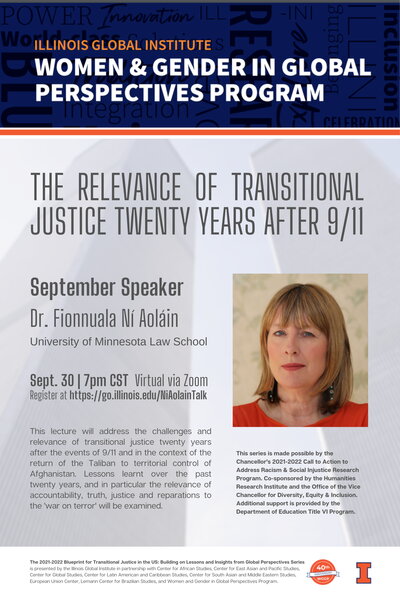
Thank you for participating in the Blueprint for Transitional Justice in the U.S. Speaker Series 2021-2022!
This speaker series is presented by the Illinois Global Institute in partnership with Center for African Studies, Center for East Asian and Pacific Studies, Center for Global Studies, Center for Latin American and Caribbean Studies, Center for South Asian and Middle Eastern Studies, European Union Center, Lemann Center for Brazilian Studies, and Women and Gender in Global Perspectives Program. This series is made possible by the Chancellor’s 2021-2022 Call to Action to Address Racism & Social Injustice Research Program and is co-sponsored by the Humanities Research Institute and the Office of the Vice Chancellor for Diversity, Equity & Inclusion. Each speaker will bring a regional focus with themes bearing on transitional justice, including policing, reparations, gender justice, economic inequality/justice, educational reform, and the role of youth. These events will be hosted via Zoom. As with all academic presenters, the views expressed by speakers do not represent the views of Illinois Global Institute, the area and global studies centers and thematic programs, or the University of Illinois Urbana-Champaign. In cases where the speaker has given permission to post the video, a link to the video is provided below.
Follow the Midwest Transitional Justice Network on Facebook, Twitter, Instagram, and LinkedIn to stay updated on events.
Archived Events 2021-2022:
Fionnuala Ní Aoláin—The Relevance of Transitional Justice Twenty Years After 9/11
September 30, 2021 | 7:00 pm to 8:30 pm | Watch a recording of this event here.
Share this event with your network on Twitter.

Fionnuala Ní Aoláin is concurrently Regents Professor and Robina Professor of Law, Public Policy and Society at the University of Minnesota Law School and Professor of Law at the Queens University, Belfast, Northern Ireland. She has published extensively in the fields of emergency powers, counter-terrorism and human rights, conflict regulation, transitional justice and sex based violence in times of war. Professor Ní Aoláin is currently the United Nations Special Rapporteur on the Protection and Promotion of Human Rights while Countering Terrorism (2017-), and was re-elected for a second term in August 2020.
This lecture will address the challenges and relevance of transitional justice twenty years after the events of 9/11 and in the context of the return of the Taliban to territorial control of Afghanistan. Lessons learnt over the past twenty years, and in particular the relevance of accountability, truth, justice, and reparations to the 'war on terror' will be examined.
Co-hosted with the Women & Gender in Global Perspectives Program.
Share this event with your network on Facebook, Twitter, and LinkedIn.
Ezequiel González-Ocantos—Transitional Justice in Latin America: Lessons for the United States?
October 21, 2021 | 12:00 pm to 1:30 pm | Watch a recording of this event here.
Share this event with your network on Facebook, LinkedIn, and Twitter.
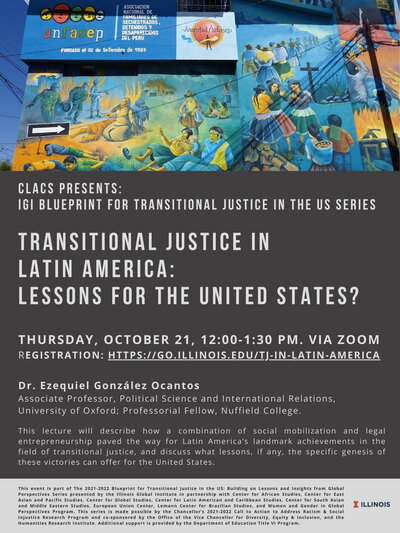
Ezequiel González-Ocantos (Ph.D. Notre Dame, 2012) is Associate Professor in the Department of Political Science and International Relations at the University of Oxford, and Professorial Fellow of Nuffield College. He is the author of Shifting Legal Visions: Judicial Change and Human Rights Trials in Latin America (Cambridge UP, 2016), winner of best book awards from APSA, LASA and ISA, and The Politics of Transitional Justice in Latin America: Power, Norms and Capacity Building (Cambridge UP, 2020). His work on judicial politics and other topics has also appeared in the American Journal of Political Science, Comparative Political Studies, Comparative Politics, International Studies Quarterly, Law and Society Review, and The International Journal of Constitutional Law, among other journals. He is currently writing a book on the politics of corruption prosecutions in Latin America.
Since the onset of the third wave of the democratization in the 1980s, debates about transitional justice have become a permanent feature of the political landscape across Latin America, pitting pro- and anti-impunity coalitions in heated fights over memory, institutions, and the law. The protracted nature of victims’ struggles as well as the recurrence of backlash against progress in the direction of truth, justice, and peace, have turned the region into a unique site of global innovation in transitional justice policies. Much of this innovation is the result of complex political bargains crafted under narrow limits of possibility, but also of the gradual bottom-up construction of a rights-affirming legal discourse grounded in international human rights law. This discourse has successfully questioned (and sometimes replaced) an old legal orthodoxy that originally was one of the main obstacles for truth- and justice-seeking initiatives. In this talk I will describe how a combination of social mobilization and legal entrepreneurship paved the way for Latin America’s landmark achievements in the field of transitional justice, and discuss what lessons, if any, the specific genesis of these victories can offer for the United States.
Co-hosted with the Center for Latin American & Caribbean Studies.
Shari Eppel, "Bones in the Forest: Exhumation and Reburial as Tools to ‘Healing The Dead’ in Matabeleland, Zimbabwe"
November 4, 2021 | 12:00-1:00pm | Watch a recording of this event here.
Share this event with your network on Twitter.
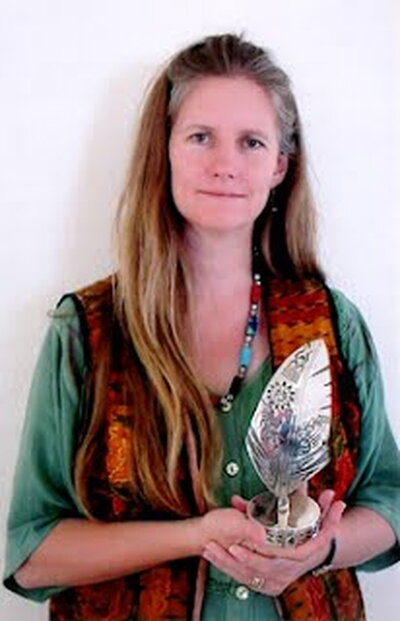
Shari Eppel is the Executive Director at Ukuthula Trust in Zimbabwe and Director at the Solidarity Peace Trust in Zimbabwe and South Africa.
Co-hosted with the Center for African Studies.
Chungmoo Choi—How Might Transitional Justice Lead to Community Restoration?
December 3, 2021 | 3:00-4:30pm
Share this event with your network on Twitter.
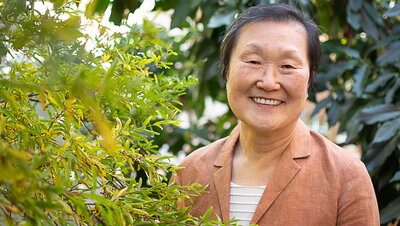
Chungmoo Choi is Professor of Korean Studies in the East Asian Studies Department at the University of California, Irvine. She is the author of Healing Historical Trauma in South Korean Film and Literature (Routledge, 2020) and co-editor/translator of Voices of the Korean Comfort Women: History Rewritten from Memories (Routledge, forthcoming in 2022).
In this presentation I will explore the relationship between affect, ethics and transitional justice by examining how South Korean society has dealt with the violent histories that occurred during the Japanese colonial period (1910-1945) and the postcolonial period. In particular, I will examine the South Korean application of the notion of transitional justice in the handling of the politically entangled Comfort Women issue that has strained the diplomatic relationship between South Korea and Japan and the politicization and controversy over the Kwangju democracy movement, the ten-day armed confrontation between the citizens of Kwangju and the military that produced both civilian and police/military casualties.
The questions I raise will include whether the measures of transitional justice, such as truth telling, achieve reconciliation among the divided communities. Further, what may be imagined for reconciliation and peace to be achieved among the divided communities so that the deep-seated distrust and trauma can be healed and broken relationships restored. I imagine affect and ethical considerations as crucial elements that may contribute to the effectivity of the legal execution of justice.
Co-hosted with the Center for East Asian and Pacific Studies.
Hakim Williams - Education for Revolutionary Non-Violence
January 25, 2022 | 12:00 pm to 1:00 pm | Watch the recording here.
Share this event with your network on Twitter.
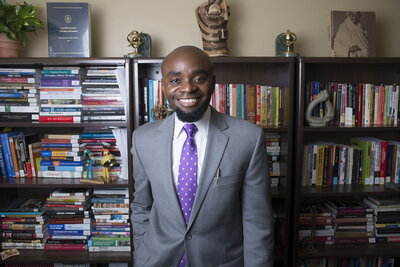
Dr. Hakim Williams (Gettysburg College) will give a talk about education for revolutionary non-violence. An unsustainably plenteous modernity taunts our emaciated minds, bodies and spirits. Neocoloniality, hyperconsumerism, global warming, racialized polarization, forced displacement, the Covid-19 pandemic: how much more can our planet and its inhabitants endure? Because violence, in its many forms, undergirds much of the aforementioned, we can't afford to continue investing our energies in the 'master's tools.' The planet and our very survival require the enactment of a revolutionary, justice-oriented non-violence. In this talk, Dr. Williams will outline what kind of education we need to envision and foster such a healing non-violence.
Co-hosted with the Center for Global Studies.
Katy Hayward—What is the Future of the Island of Ireland after Brexit?
February 9, 2022 |1:00-2:00pm | Watch a recording of the talk here.
Share this event with your network on Twitter.
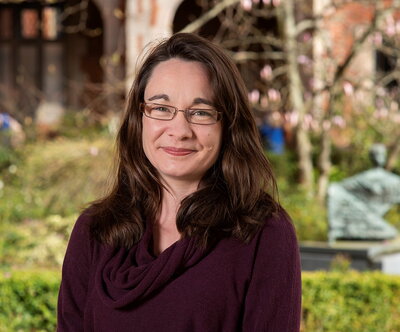
The UK’s withdrawal from the European Union has fundamentally altered the conditions and assumptions regarding the 1998 Agreement and what it meant for the future of the island of Ireland. Relations between Britain and Ireland are completely reworked (Strand 3). North-south cooperation (Strand 2) is made more difficult. And unionist/nationalist power-sharing (Strand 1) is under increasing strain. This presentation outlines the ways in which the whole island has been affected by Brexit and, indeed, what remains stubbornly unchanged. In so doing, it considers what adjustments might need to be made as this process of transition evolves. Drawing on evidence from legal and policy documents as well as on data on public opinion, the purpose of the lecture is to offer a nuanced picture of what the post-Brexit future of the island might be.
Katy Hayward is Professor of Political Sociology at Queen’s University Belfast, a Fellow of the Senator George J. Mitchell Institute for Global Peace, Security and Justice, and a Senior Fellow in the UK in a Changing Europe think-tank where she leads a project on ‘The post-Brexit status and future of Northern Ireland’. The author of over 350 publications, her latest books are a co-authored book on Northern Ireland a Generation after Good Friday (MUP, 2021) and a monograph titled ‘What do we know and what should we do about… the Irish border’ (Sage, 2021). The recipient of an Eisenhower Fellowship (2019), and the ‘Political Communicator of the Year’ award from the Political Studies Association (2019), Prof Hayward has written and presented to media, policy, civic and academic audiences worldwide.
Co-hosted with the European Union Center.
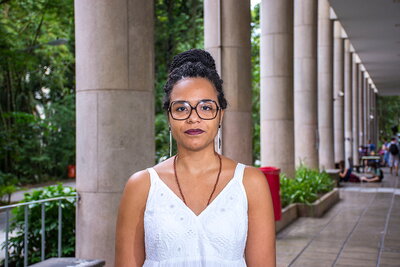
Thula Pires—Untouched Structures: Racism and the Experience of Brazilian Transitional Justice
March 8, 2022 | 2:00 pm to 3:30 pm
Share this event with your network on Twitter.
The proposed discussion intends to racialize the production of memory about the business-military dictatorship (1964-1985) in Brazil. Torture is the foundational landmark not only of this period, but of the colonial-slavery experience itself that organized the foundation of the Brazilian State and its institutions. From a legal and historical perspective, this discussion rethinks slavery as a laboratory for the later use of force by the state as well as of the constitution of public (in)security policies that primarily victimize black, indigenous, and dissident bodies, even their very existence. As one of the ideological mechanisms of the business-military regime, the myth of racial democracy mobilized long-standing processes of dehumanization that inscribed racist logics and practices in the operations led by public (in)security forces during and after the dictatorship. The goal is to trace some of these continuities that can be exemplified in the recent episode of torture known as the “case of the red room” that occurred in 2018. In so doing, this presentation follows a path different from that laid out by state and federal Truth Commissions in Brazil. Far from being one factor of many, to be registered and redressed, the category of race is not only built into but also encompasses the wider field of oppression and domination that delimit the choices guiding the current model of transitional justice model being carried out in Brazil.
Thula Pires is the mother of Dandara, Ekéjì de Ọ̀ṣọ́ọ̀si and a dancer. She is Associate Professor (Professora-Adunta) of Constitutional Law at PUC-Rio, where she also coordinates the “Interdisciplinary Center for Afro-descendant Reflection and Memory” (NIREMA) as well as the law and race research group, “Direito em Pretuguês: Grupo de Pesquisa em Estudos Ladino-Amefricanos e Afrodiaspóricos”. Visiting Researcher at the African Gender Institute, University of Cape Town, supported by CAPES/PRINT 2020. She is also an affiliate of Criola (Organization of Black Women), member of the General Assembly of Amnesty International in Brazil, and board member of the Climate and Society Institute.
Co-hosted by the Lemann Center for Brazilian Studies.
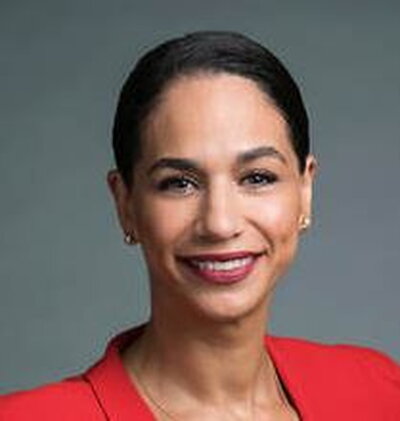
Noura Erakat, Rutgers University, New Brunswick
April 13, 2022 | 4:00 pm to 5:30 pm | Watch a recording of this event here.
Share this event with your network on Facebook, LinkedIn, and Twitter.
Noura Erakat is a human rights attorney, Associate Professor of Africana Studies at Rutgers University, and non-resident fellow of the Religious Literacy Project at Harvard Divinity School. Noura is the author of Justice for Some: Law and the Question of Palestine (Stanford University Press, 2019), which received the Palestine Book Award and the Bronze Medal for the Independent Publishers Book Award in Current Events/Foreign Affairs. She is co-founding editor of Jadaliyya and editorial board member of the Journal of Palestine Studies. She has served as Legal Counsel for a Congressional Subcommittee in the US House of Representatives, as Legal Advocate for the Badil Resource Center for Palestinian Refugee and Residency Rights, and as national organizer of the US Campaign to End the Israeli Occupation. Noura has also produced video documentaries, including "Gaza In Context" and "Black Palestinian Solidarity." She has appeared on CBS News, CNN, Fox News, and NPR, among others.
This lecture seeks to trace the drafting history of UN General Assembly Resolution 3379 declaring Zionism as a form of racism with an emphasis on how the text and process shaped a racial theory of Zionist settler-colonization. Fayez Sayegh, Palestinian scholar and founder of the Palestine Research Center, and who would be a leading force in passing the Resolution, provided one of the earliest racial theories of Zionism in 1965. In his essay he explains that Zionism is constituted of three elements, racial purity, racial supremacy, and racial segregation and driven by a policy of “racial elimination.” Notably, Resolution 3379 was not an initiative of the Palestinian Liberation Organization thus providing the earliest indications that the while the nationalist movement understood the racial dimensions of Palestinian subjugation, it believed its struggle was primarily an anti-colonial one for independence. This ambiguity regarding the exact contours of the relationship between racism and colonialism was also evident in the diplomatic process. Despite enthusiastic support for Palestinian self-determination among the African nations that led the Decade Against Racism, there was mixed support for Resolution. The Resolution ultimately passed only to be rescinded by the PLO itself in 1991. This lecture seeks to revisit this diplomatic and intellectual history for the sake of considering an alternative trajectory of the Palestinian freedom struggle as one against racism.
Co-hosted by the Center for South Asian and Middle Eastern Studies.